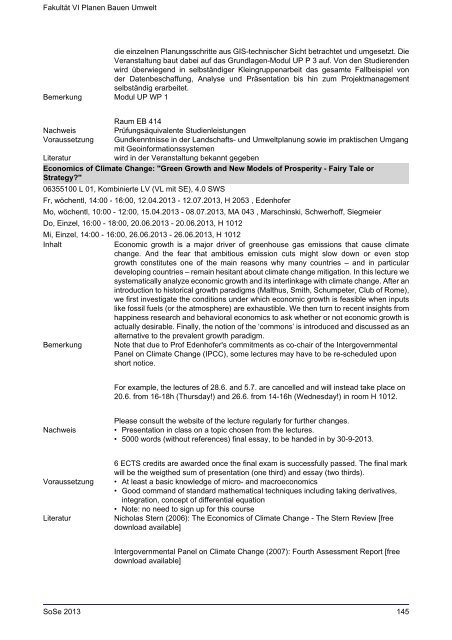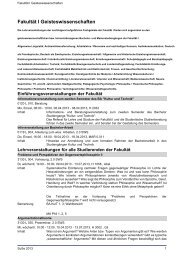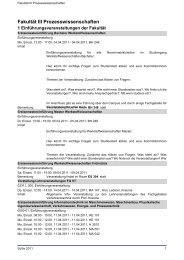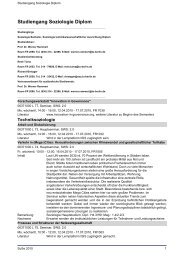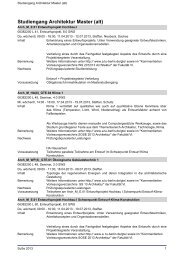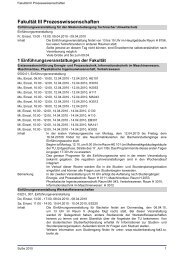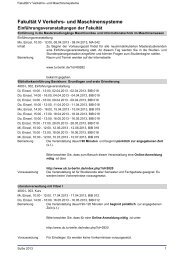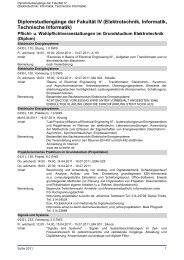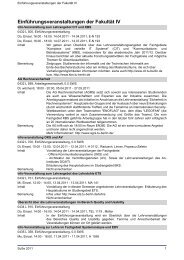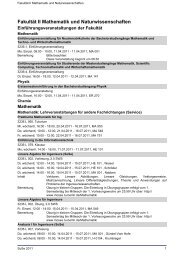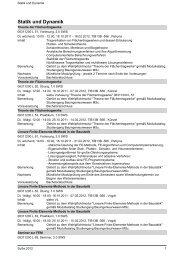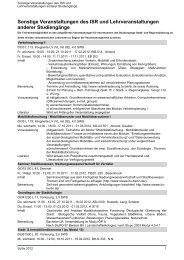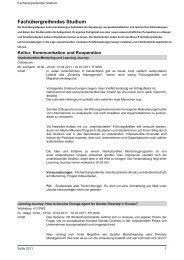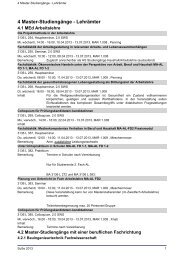Gesamte Fakultät VI - TU Berlin
Gesamte Fakultät VI - TU Berlin
Gesamte Fakultät VI - TU Berlin
Sie wollen auch ein ePaper? Erhöhen Sie die Reichweite Ihrer Titel.
YUMPU macht aus Druck-PDFs automatisch weboptimierte ePaper, die Google liebt.
<strong>Fakultät</strong> <strong>VI</strong> Planen Bauen Umwelt<br />
die einzelnen Planungsschritte aus GIS-technischer Sicht betrachtet und umgesetzt. Die<br />
Veranstaltung baut dabei auf das Grundlagen-Modul UP P 3 auf. Von den Studierenden<br />
wird überwiegend in selbständiger Kleingruppenarbeit das gesamte Fallbeispiel von<br />
der Datenbeschaffung, Analyse und Präsentation bis hin zum Projektmanagement<br />
selbständig erarbeitet.<br />
Bemerkung Modul UP WP 1<br />
Raum EB 414<br />
Nachweis Prüfungsäquivalente Studienleistungen<br />
Voraussetzung Gundkenntnisse in der Landschafts- und Umweltplanung sowie im praktischen Umgang<br />
mit Geoinformationssystemen<br />
Literatur wird in der Veranstaltung bekannt gegeben<br />
Economics of Climate Change: "Green Growth and New Models of Prosperity - Fairy Tale or<br />
Strategy?"<br />
06355100 L 01, Kombinierte LV (VL mit SE), 4.0 SWS<br />
Fr, wöchentl, 14:00 - 16:00, 12.04.2013 - 12.07.2013, H 2053 , Edenhofer<br />
Mo, wöchentl, 10:00 - 12:00, 15.04.2013 - 08.07.2013, MA 043 , Marschinski, Schwerhoff, Siegmeier<br />
Do, Einzel, 16:00 - 18:00, 20.06.2013 - 20.06.2013, H 1012<br />
Mi, Einzel, 14:00 - 16:00, 26.06.2013 - 26.06.2013, H 1012<br />
Inhalt Economic growth is a major driver of greenhouse gas emissions that cause climate<br />
change. And the fear that ambitious emission cuts might slow down or even stop<br />
growth constitutes one of the main reasons why many countries – and in particular<br />
developing countries – remain hesitant about climate change mitigation. In this lecture we<br />
systematically analyze economic growth and its interlinkage with climate change. After an<br />
introduction to historical growth paradigms (Malthus, Smith, Schumpeter, Club of Rome),<br />
we first investigate the conditions under which economic growth is feasible when inputs<br />
like fossil fuels (or the atmosphere) are exhaustible. We then turn to recent insights from<br />
happiness research and behavioral economics to ask whether or not economic growth is<br />
actually desirable. Finally, the notion of the ‘commons’ is introduced and discussed as an<br />
alternative to the prevalent growth paradigm.<br />
Bemerkung Note that due to Prof Edenhofer's commitments as co-chair of the Intergovernmental<br />
Panel on Climate Change (IPCC), some lectures may have to be re-scheduled upon<br />
short notice.<br />
For example, the lectures of 28.6. and 5.7. are cancelled and will instead take place on<br />
20.6. from 16-18h (Thursday!) and 26.6. from 14-16h (Wednesday!) in room H 1012.<br />
Please consult the website of the lecture regularly for further changes.<br />
Nachweis • Presentation in class on a topic chosen from the lectures.<br />
• 5000 words (without references) final essay, to be handed in by 30-9-2013.<br />
6 ECTS credits are awarded once the final exam is successfully passed. The final mark<br />
will be the weigthed sum of presentation (one third) and essay (two thirds).<br />
Voraussetzung • At least a basic knowledge of micro- and macroeconomics<br />
• Good command of standard mathematical techniques including taking derivatives,<br />
integration, concept of differential equation<br />
• Note: no need to sign up for this course<br />
Literatur Nicholas Stern (2006): The Economics of Climate Change - The Stern Review [free<br />
download available]<br />
Intergovernmental Panel on Climate Change (2007): Fourth Assessment Report [free<br />
download available]<br />
SoSe 2013 145


